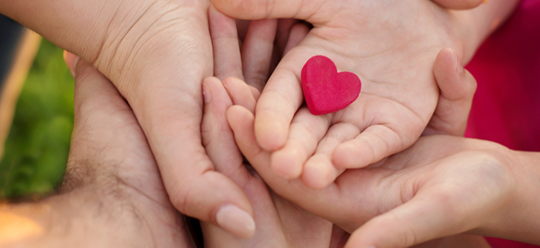Newsletter: October 2014
Nurturing Kindness: Try our Simple Recipe

A warm smile is the universal language of kindness.
October is Pacer’s National Bullying Prevention Month.
According to Pacer’s website, nearly 1 in 3 students (27.8%) report being bullied during the school year. That’s a powerful statistic. But kindness can be a powerful weapon against bullying.
The ability to put yourself in someone else’s shoes, or consider the impact of your actions on another person, or attempt to lighten the load for someone who is having a hard day by offering a smile or an ear, are all ways we demonstrate kindness. They are also all qualities that can be learned and reinforced at home—even at the dinner table. Here’s how:
Be a Role Model for Empathy.
The dinner table can be an ideal incubator for modeling empathy. A simple way to do this is to ensure that everyone who wants to gets a turn to talk, and then everyone else listens so the speaker feels that his or her words and experience matter. This means that eye contact is made with the person who is speaking, only one person speaks at a time, and you occasionally register that you understand how your child or spouse is feeling.
Emphasize the Positive.
When children share stories at the table about their days, you might point out and praise acts of kindness shown toward siblings, friends, pets, and others. By highlighting these acts, you are positively reinforcing your child in making good choices! You can also ask them to point out nice things others have done for them recently, and of course share your own stories of kindness—both given and received— from the day.
Perform a Kindness Mission.
Surprise a friend, or a neighbor or even a charity by doing something thoughtful. You can brainstorm ideas at dinner, or you can use the kid-friendly suggestions we offer in The Family Breakfast Project to give your kids a kindness mission for the day and then have them report back at dinner. Another variation of this idea might be to put all family member’s names in a jar and have each person choose someone they will do something nice for that day.
Have Conversations that Matter.
Our Conversations of the Week are ideal for fostering conversations about ethical issues in the world today. Every week we choose a story from the news and develop age-appropriate questions to help make the dilemma relevant to children’s daily lives and the choices they face. Below we offer a few examples on the topic of bullying, but feel free to also peruse all of our Conversations of the Week.
Fumble or Touchdown
A Big Bully’s Punishment
When Bullying Turns Deadly
Food

It’s October—how about some Pumpkin Butter or Pumpkin Pull Apart Bread this month? (Bonus: Easy enough for kids to make!)
Fun
Who’s Coming to Dinner
Everyone at the table gets to pick a person they would invite to dinner and explain why. The dinner guest can be anyone from any period in time, famous or not. What would you make for this person? What games might you play? A variation: jot down all of the choices and imagine them at your table at the same time. What would they have in common? How would they get along? Finally, if you’re feeling up to it, actually invite someone to dinner! See more fun game ideas!
Conversation
Our conversation starters this month are all about bullying.
Age 2-7
What does the word “bullying” mean to you?
If bullying were a color what color would it be? If it were a food, what food what it be?
Can you think of a real person or a television, book or movie character who acts like a bully. How?
Age 8-13
Have you and your friend ever left someone out on purpose? Do you think that was bullying? Why or why not?
Have you ever done or said anything when you’ve witnessed someone being bullied? If not, imagine what you might do in that situation.
The singer Taylor Swift said, ““If you’re horrible to me, I’m going to write a song about it, and you won’t like it. That’s how I operate.” What can you do to make yourself feel better if someone is mean to you?
Age 14-100
Share a story about bullying from your childhood. Were you the bully, the bullied, a bystander?
Can adults be bullies? Explain your answer with a specific example.
Recent Newsletters
- Ask The Family Dinner Project - February 2026
- Warming Up Winter - January 2026
- Home, and Homemade, for the Holidays - December 2025
- Thanksgiving Traditions, Old and New - November 2025
- Food as Comfort and Care - October 2025
- The State of Family Dinner - September 2025
- Back to School Dinner Success - August 2025
- What’s Your Meal Planning Personality? - July 2025
- A New Guide to Gathering - June 2025
- Celebrating 15 Years of The Family Dinner Project - May 2025
- New Research: Family Dinners Boost Happiness - April 2025
- Just the Two of Us - March 2025

